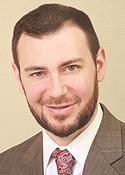Law School Alumnus and Lecturer Teamed Up for Thorny Supreme Court Case
Law School Alumnus and Lecturer Teamed Up for Today's Supreme Court Case
Media Contact: Public Affairs, 212-854-2650 or [email protected]
New York, Nov. 7, 2011—Akiva Shapiro ’08 will be at the U.S. Supreme Court today, when Columbia Law School Lecturer-in-Law Nathan Lewin argues a high-profile case. Shapiro is not only a former student of Lewin, but the principal author of a pro bono amicus brief filed on behalf of a bipartisan group of U.S. senators and representatives in support of Lewin’s client.
The case to be argued, Zivotofsky v. Clinton, challenges the U.S. State Department’s refusal to record on a passport that a U.S. citizen born in Jerusalem was born in Israel. Petitioners are the parents of a Jerusalem-born boy who brought a lawsuit to enforce a 2002 law that requires the State Department to permit such a designation.
The questions posed are: Is the law constitutional? And does the Supreme Court have the power to rule on the issue?
The answers are “yes” and “yes,” says Shapiro, who got hired right out of law school as an associate with Gibson, Dunn & Crutcher LLP in New York, where he is a member of the appellate and constitutional law practice.
Lewin, a senior partner at Washington, D.C.-based Lewin & Lewin, LLP, has argued 27 cases before the Supreme Court. Shapiro first met him when Shapiro took the “Religious Minorities in Supreme Court Litigation” seminar which Lewin teaches every spring at the Law School. The seminar motivated Shapiro to devote a substantial amount of his time to pro bono cases, especially those involving religious minorities.
In his current job, Shapiro works primarily on matters before New York State’s appellate and trial courts, often involving constitutional questions, and has also been involved in a number of U.S. Supreme Court cases. “But I always had in the back of my mind the idea that at some point it would be nice to work with Professor Lewin,” he says.
Akiva Shapiro '08 reunites with his former professor on Zivotofsky case.
The first politician to champion the parents in the Zivotofsky case was former U.S. Representative Anthony Weiner, who asked solo practitioner Paul Kujawsky to file a brief with the U.S. Supreme Court in support of Zivotofsky’s petition for a writ of certiorari. In early May 2011, when the court agreed to hear the case, Shapiro called Kujawsky and then Lewin, proposing that his firm would prepare an amicus brief in support of the petitioner on behalf of members of the U.S. Congress, with the approval of Gibson Dunn litigation chair Randy Mastro.
U.S. Senators Joseph Lieberman, Jon Kyl, and Carl Levin sent out a letter soliciting support for the amicus brief from their colleagues, resulting in a bipartisan mix of signatories, including 28 senators and 11 members of the U.S. House of Representatives. Shapiro and his team got to work, and filed the brief on August 5.
The team included Mastro, Shapiro (who was responsible for day-to-day preparation of the brief), Kujawsky and a number of junior attorneys. Shapiro recalls that he and his colleagues at Gibson, Dunn spend “hundreds of hours” researching the issues and writing the brief.
Shapiro did a “terrific job” with the brief, Lewin says, noting that in addition to researching and writing it, Shapiro had to get the content approved by numerous congressional offices as well as by Theodore Olson, co-chair of Gibson Dunn’s appellate and constitutional law group.
One of the best aspects of the experience was working with Lewin again, according to Shapiro.
“He’s incredibly accomplished,” Shapiro says, “but at the same time always has a warmth and a smile. That’s the thing that drew me to him.”
The first time Shapiro attended a Supreme Court hearing was in 2007 when he was taking Lewin’s seminar and the class traveled to Washington to hear oral argument in Hein v. Freedom from Religion Foundation Inc.
“It’s nice to come full circle,” he says.
###
Columbia Law School, founded in 1858, stands at the forefront of legal education and of the law in a global society. Columbia Law School joins its traditional strengths in international and comparative law, constitutional law, administrative law, business law, and human rights law with pioneering work in the areas of intellectual property, digital technology, sexuality and gender, criminal, national security, and environmental law.
Visit us at http://law.columbia.edu
Follow us on Twitter http://www.twitter.com/columbialaw
